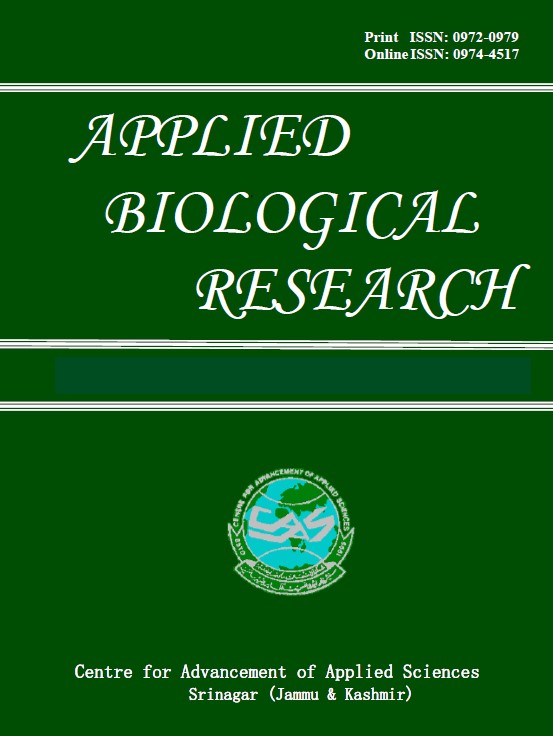Genetic Variation For Some Morphological Characters In Desi Cotton (Gossypium Arboreum L.)
DOI:
https://doi.org/10.48165/Keywords:
Gossypium arboreum, leaf shape, nectarines, petal colour, pollenAbstract
The present investigation was carried out to assess genetic variation for some easily observable traits in a set of 64 germplasm lines of Asiatic cotton (Gossypium arboreum L.). The morphological characters included plant body colour, colour of petals and anthers, leaf shape and presence/absence of leaf nectary. Green plant colour, yellow petal and anther colour, digitate leaf shape, and absence of nectary were observed to be predominant morphological characters among the desi cotton lines studied. Of the 64 cotton genotypes evaluated, 56 were observed to have green and eight pigmented plants. Desi cotton genotypes exhibited following petal colours: yellow (38), white (13), variegated (7), cream (4), red (1) and off-white (1). Majority of the genotypes (59) possessed digitate (narrow lobed) leaves. The present study has provided an insight into the genetic variation for some morphological characters in desi cotton genotypes. Though morphological markers have their own limitations, yet these traits being independent of the effects of environment, may be used for the identification of cotton germplasm especially in seed production plots.
Downloads
References
Fryxell, P.A. 1984. Taxonomy and germplasm resources. pp. 27-58. In: Cotton (eds. R.J. Kohel and C.F. Lewis), Agronomy Monograph 24, ASA, Madison, USA.
Gupta, V.K., Kumar, P., Sekhon, P.S., Joia, B.S. and Dilawari, V.K.2006. Molecular screening of cotton germplasm for resistance to whitefly transmitted leaf curl disease through virus specific PCR amplification. Journal of Insect Science, 19: 67-72.
Lee, J.A. and Fang, D.D. 2015. Cotton as a world crop: origin, history, and current status. pp. 1-23. In: Cotton (eds. David D. Fang and Richard G. Percy), Agronomy Monograph, ASA, Madison, USA.
Lukefahr, M.J. and Rhyne, C. 1960. Effects of nectariless cotton on population of three lepidopterous insects. Journal of Economic Entomology, 53: 242-244.
Manickam, S. 2005. Morphological characterization of cotton varieties. pp. 64-68. In: Training manual on DUS Test in cotton with reference to PPV & FR legislation, 2001. (Compiled by K. Rathinavel, S. Manickam and M. Sabesh ), CICR Regional Station, Coimbatore, India.
Meredith, W.R. Jr. 1991. Contributions of introductions to cotton improvement. pp. 127-146. In: Use of Plant Introductions in Cultivar Development, Part I (eds. H.L. Shands and L.E. Wiesner). CSSA Special Publication, CSSA, Madison, USA.
Meredith, W.R. Jr., Ranney, C.D., Laster, M.L. and Bridge R.R. 1973. Agronomic potential of nectariless cotton (G. hirsutum L.). Journal of Environmental Quality, 2: 141-144. Narula, A.M., Monga, D., Chauhan, M.S. and Raj, S.1999. Cotton leaf curl virus disease in India The challenge ahead. Journal of Cotton Research and Development, 13: 129-138. Rashida, P., Sultan, M.K., Khan, M.A. and Islam, N.U. 2005. Screening of cotton germplasm against cotton leaf curl begomovirus. Journal of Agriculture and Social Sciences, 1: 235-238. Sangwan, R.S., Siwach, S.S. and Kumar, R. 2008. Evaluation of genetic stocks of desi cotton. Journal of Plant Genetic Resources, 21: 68-71.
Sarao, N.K., Joshi, M.A., Sharma, R.C., Pathak, D. and Singh, J. 2009. Evaluation of morphological descriptors for varietal characterization in cotton (Gossypium spp.). Indian Journal of Ecology, 36: 123-130.
Singh L., Khangura, R.S. and Pathak, D. 2016. Evaluation of genetic divergence in Asiatic cotton. SKUAST Journal of Research, 18: 90-95.
Singh, J., Sohi, A.S., Mann, H.S. and Singh J. 1997. Screening of cotton germplasm against cotton leaf curl viral disease using its vector Bemisia tabaci (Genn.). Journal of Research PAU, 34: 294-298.
Stanton, M.A., Stewart, J.M.D., Percival, A.E. and Wendel, J.F. 1994. Morphological diversity and relationships in the A-genome cottons, Gossypium arboreum and G. herbaceum. Crop Science, 34: 519-527.

